No. 21, Vol. 3. Autumnal Equinox 2011
The Natal Guardian Angel(s) & Other Astrologically-Derived Angels
by Brian Pivik
Introduction
In this paper[1] I have given a large amount of information on the “creation” of angels based solely on your natal chart. It is imperative that you obtain accurate information regarding your birthplace and time in order to fully utilize this process. You are free to use whichever western-style natal chart suits you, though Placidus and Koch are the most common, and (in my opinion) the most reliable. I have not attempted the following using Vedic systems.
When speaking of “creating” angels, I mean one of two things which you can interpret in your own way:
- finding the angel(s) associated with you, and/or
- “creating” them from your chart.
In other words, you are either “finding” the angels based on your chart, or that you are “creating” them. Whichever you choose for your particular worldview is your opinion. I have my own, but feel it’s important to work through this concept on your own.
I would also like to make the point that your HGA is separate from the Angelic Names derived in this paper.[2] These Angels are related directly to your birth chart, while according to tradition, the HGA is “above” the influences of the planets and the zodiac.
Deriving the Names
In Agrippa’s “Three Books of Occult Philosophy,” he outlines the essentials needed for “creating” an angelic name based on your natal chart:
The ancient magicians did teach an art of finding out the name of a spirit to any desired effect, drawing it from the disposition of the heaven; as for example, any celestial harmony being proposed to thee for the making an image or ring, or any other work to be done under a certain constellation; if thou will find out the spirit that is the ruler of that work; the figure of the heaven being erected, cast forth letters in their number and order from the degree of the ascendent, according to the succession of signs through each degree by filling the whole circle of the heaven: then those letters which fall into the places of the stars the aid whereof thou wouldest use, being according to the number, and powers of those stars, marked without into number, and order, make the name of a good spirit: but if thou shalt do so from the beginning of a degree falling against the progress of the signs, the resulting spirit shall be evil.[3]
This concept is borne out in much greater detail in Tyson’s version of “The Fourth Book of Occult Philosophy,” pages 118 ff.
In short, the practitioner erects a blank astrological chart, placing the first letter of the Hebrew alphabet (Alef) on the ascendant, and place the rest of the letters counter-clockwise in order in each of the remaining 30 degrees of each house, repeating the alphabet when necessary (after coming to Tau). The evil angels are derived by starting from the descendant and placing the letters clockwise.[4] As we shall see, their derivation is different than the Good Angels. Since the size of such a chart would take up a huge amount of space, this is much easier to show in tabular form, as portrayed on the next few pages.
The creation of a variety of angelic beings is outlined following the charts, but the first step you’ll need to do is find your natal chart, and follow along with our example.
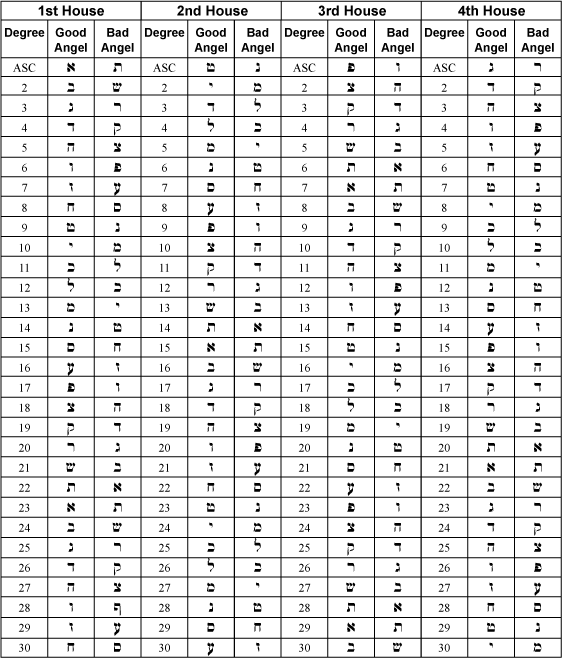
Chart 1a[5]
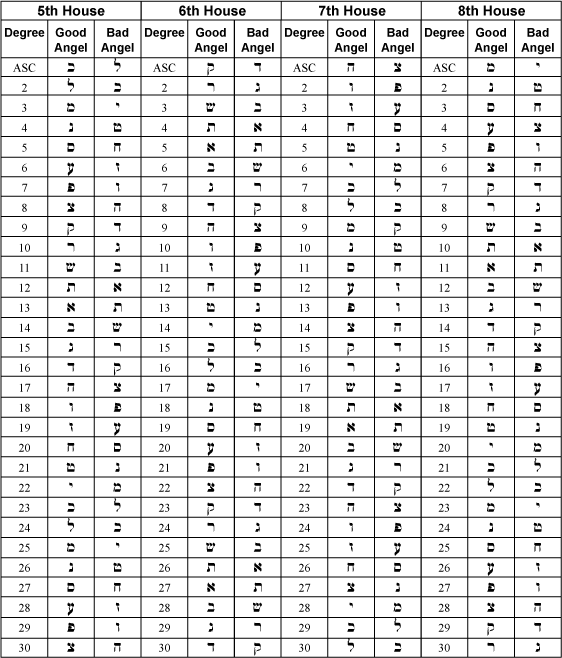
Chart 1b
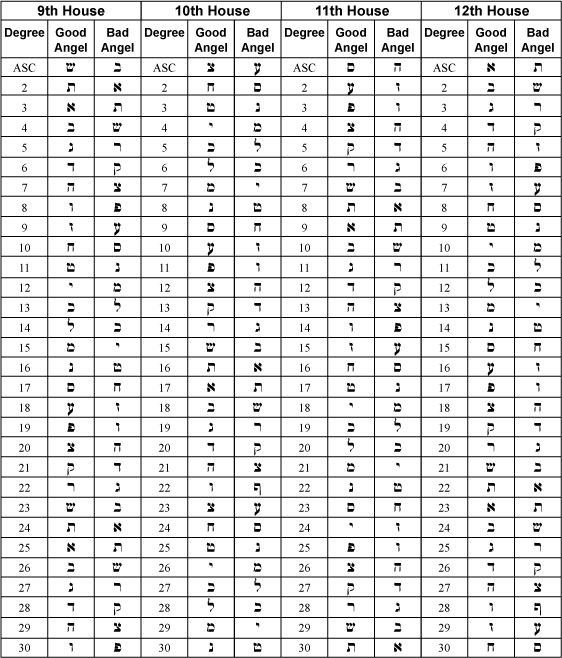
Chart 1c
Using the Above Charts
Part I: The ASC Method
I’ve named this method "ASC" because it utilizes the Angular, Succedent and Cadent Houses (the process itself has very little do with the Ascendant). One other note of import: this method utilizes only the seven traditional planets.
Agrippa gives some hints about what the practitioner is to do regarding the creation of Angelic names utilizing the above charts:
By this art some of the Hebrew and Chaldean masters teach that the nature, and name of any genius may be found out; as for example, the degree of the ascendent of anyone's nativity being known, and the other corners of the heaven being coequated, then let that which had the more dignities of planets in those four corners, which the Arabians call almutez, be first observed amongst the rest: and according to that in the second place, that which shall be next to it in the number of dignities, and so by order the rest of them, which obtain any dignity in the foresaid corners: this order being used, thou mayest know the true place, and degree of them in the heaven, beginning from the degree of the ascendent through each degree according to the order of signs to cast twentytwo of the letters of the Hebrews; then what letters shall fall into the places of the aforesaid stars, being marked, and disposed according to the order found out above in the stars, and rightly joined together according to the rules of the Hebrew tongue, make the name of a genius: to which, according to the custom, some monosyllable name of divine omnipotency, viz. El, or Iah is subjoined. But if the casting of the letters be made from an angle of the falling, and against the succession of signs, and the letters which shall fall in the nadir (that is, the opposite point) of the aforesaid stars, be after that order as we said, joined together, shall make the name of an evil genius.[6]
This first section outlines the concept of taking one’s natal chart (I’ve given W.B. Yeats’ at the end as an example, from which I will be creating Names of Angelic beings for this paper), moving in order of the Angular ones (1st, 4th, 7th and 10th), outlining which of the houses contain the most (or the best-aspected planets), then moving to Succedent, then Cadent, finally forming a Name from them.
First, find your Ascendant degree. This will obviously refer to the first house in the above chart. The degree of the Ascendant will depend on the chart itself, and is the corresponding row. Find the planets therein and note their relative astrological “weight.” This “weight” depends upon five major factors:
- The Rulership of the planet(s) – if the planet(s) Rule the sign they’re in, they receive 5 “points” in the Ptolemaic system.
- The Exaltation of the planet(s) – see the chart below. Each planet in Exaltation receives 4 “points.”
- The Triplicity of the planet(s) – see the chart below. Each planet in the corresponding Triplicity receives 3 “points.”
- The Term of the planet(s) – see the chart below. Each planet in its Term receives 2 “points.”
- The Face of the planet(s) – see the chart below. Each planet in its Face receives 1“point.”
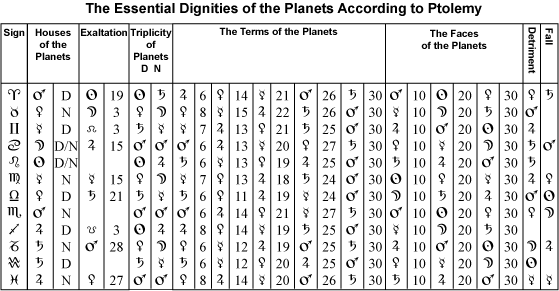
Chart 2[7]
Guide to the above chart:
- Column one shows the signs.
- Column 2 contains the Night and Day Houses.
- Column 3 shows the specific degree of exaltation - these degrees are particularly notable although the dignity of exaltation is generally applied to the whole of the sign.
- The fourth column shows the planetary rulership of the triplicities. You will see that the pattern repeats for the fire triplicity - Aries, Leo and Sagittarius and so on. The D and N again stand for the Day and Night rulers.
- The fifth column shows where rulership by term transfers. That is, Jupiter rules the first six degree of Aries, from 0°00' - 5°59'; Venus rules from 6°00' - 13°59 Aries.
- The sixth column shows the degrees where rulership by face transfers. That is, Mars rules the first ten degree of Aries, from 0°00' - 9°59'; the Sun rules from 10°00' - 19°59 Aries.
- The seventh column shows the signs where the planets experience detriment. These are the signs opposite the ones they rule, so apart from the Sun and Moon, each planet has two signs of detriment just as they have two signs of rulership.
- The eighth column shows the signs where the planets experience fall. These are opposite the signs of exaltation, so each planet has only one sign of fall, just as they have only one sign of exaltation. Although the debility is applied throughout the sign, the specific degrees mentioned in the list of exaltations carry extra significance, so the 28th degree of Cancer is particularly notable as a degree of debility for Mars, being the sign and degree of its fall.
Now, in Yeats’ chart, we must determine if it was night or day when he was born. 10:40 pm is likely evening, so we move on to our next step. Yeats’ first house contains Luna in 19˚ Aquarius, 46’. So for this planet, we consult the chart above and find Aquarius. Moving across the chart, we only find one symbol of Luna, and since it rules the “face” of 21˚00’ to 29˚59’, this planet has no essential dignities.
Next, move on to the 4th and repeat, doing the same with all planets or planet in the 7th and 10th Houses.
In Yeats’ 4th, we find no planets. His 7th contains Mars (12˚02’ in Leo). Again referring to our chart, we see that the “term” of Mars ends at 19˚, so this means Mars gets 2 “points.” In his 10th house, there are no planets, so we end there with our analysis of the Angular Houses.
We then begin again, with the Succedent Houses. His 2nd House contains a South Node (28˚29’ in Aries)—don’t forget to skip the outer planets! Again, there’s no relationship here, so it gets a point of 0. The fifth house contains Sol 22˚51’ in Gemini. The only match is to the face of the planet, so it gets 2 “points.” Next is the 8th house, with Saturn 23˚44’ Libra. Saturn in Libra is exalted, therefore it gets 4 points. It’s also matching the term of the planet, so 2 more for a total of 6 points for Saturn. Next up is the North Node, again meeting 0 points. Finally, we come to the 11th House, containing Jupiter at 24˚18’ Sagittarius. This is a Night Triplicity, so 3 points for it.
Finally, we come to the Cadent Houses. Yeats’ 3rd House has Venus 13˚21 Taurus and Mercury 03˚56’ Gemini. Venus Rules the Night House, gaining 5 points. Mercury is in its Night Triplicity, gaining 3, plus it’s in Term, so another 2 equals 5 total points (we could count it as the Ruler of Mercury, but it’s in the night).
So, for all the Angular, Succedent and Cadent houses, we have in order of points (or essential dignity), then House placement:
Planet |
Degree |
Sign |
House |
Angular, Succedent, Cadent |
Points |
| 1. Saturn | 23˚44’ | Libra | 8th | Succedent | 6 |
| 2. Venus | 13˚21 | Taurus | 3rd | Cadent | 5 |
| 3. Mercury | 03˚56’ | Gemini | 3rd | Cadent | 5 |
| 4. Jupiter | 24˚18’ | Sagittarius | 11th | Succedent | 3 |
| 5. Mars | 12˚02’ | Leo | 7th | Angular | 2 |
| 6. Sol | 22˚51’ | Gemini | 5th | Succedent | 2 |
| 7. Luna | 19˚46’ | Aquarius | 1st | Angular | 0 |
| 8. South Node | 28˚29’ | Aries | 2nd | Succedent | 0 |
| 9. North Node[8] | 28˚29’ | Libra | 8th | Succedent | 0 |
Now, to find the Name of the Good Angel. Starting with the Planet with the highest number of points, Saturn and working down, we consult the main chart on pages 3-4. First, we find the 8th house, where Saturn is, and look down to the 23˚ row, finding the letter Mem (![]() ). This is the first letter of the name of Yeats’ Good Angel. We then repeat the process for each planet in order of the chart above, and come up with:
). This is the first letter of the name of Yeats’ Good Angel. We then repeat the process for each planet in order of the chart above, and come up with:
![]()
I.1: Finding the Vowels.
Since Hebrew contains no vowels, we must decide upon a manner in which to add the vowels to our new Angelic Name. There are two methods to add these, one a traditional Kabbalistic one from Abraham Abulafia, and the second from Agrippa’s The Fourth Book of Occult Philosophy.
The latter is a variation of the method of finding the Part of Fortune in astrology. Begin with the degree of the zodiac on the cusp of the 11th house (in Yeats’ chart, 21˚, which means it is at 304˚). From 304, we subtract the degree occupied by the planet standing for the first letter of the Good Angel’s name (for Yeats, Saturn is at 23˚ Libra, 8th house, making it 254˚, therefore the difference is 50˚. Now, we must again refer to yet another chart, showing the vowels a-e-i-o-u, starting at the ascendant and moving around the chart counterclockwise just as the Hebrew chart above.
I personally find this method quite restrictive and laborious, especially given the fact that the practitioner must count degrees for every letter, subtract the amount between itself and the previous letter.
A simpler method is to utilize Abulafia’s system, shown in the chart below. Note that the vowels contain numerical value as well, and can give the practitioner another gematria to examine.
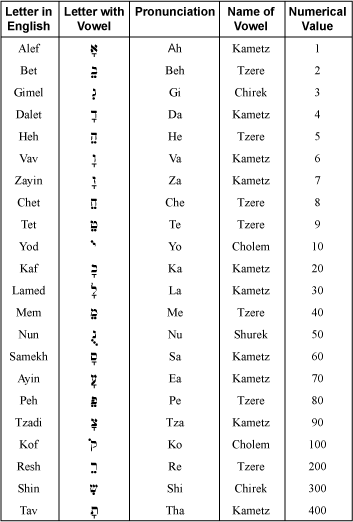
Chart 3[9]
From this method, we can quickly derive the vowels for ![]() , Yeats’ Good Angel into Mezaqo’a’ayoqonutza.
, Yeats’ Good Angel into Mezaqo’a’ayoqonutza.
I.2: Suffixes.
In his Three Books of Occult Philosophy, Agrippa states that one can add the suffixes Yah, El, On, or Yod.[10] The Hebrew versions of each and their gematria are as follows:
- Yah:
 (15)
(15) - El:
 (31)
(31) - On:
 (56 or 706)
(56 or 706) - Yod:
 (14) or
(14) or  (20) or
(20) or  (10)
(10)
He states that “Jah is a name of beneficence, and Jod the name of a deity, therefore these two names are put only to the names of [good] angels; but the name El, because it imports power, and virtue, is therefore added not only to good but bad spirits, for neither can evil spirits either subsist, or do anything without the virtue of El, God.”[11] Agrippa does not intimate about the use of –on, but since it’s used for Metatron and Sandalphon, I would wager that it is utilized only for Good Angels.
One other consideration is the gematria of these choices, which I have given above. When adding one possibility to an angelic name, research on the final gematria using a dictionary to create the desired characteristics of the angel.[12]
Part II: The Chaldean Method
But the Chaldeans proceed another way; for they take not the almutez of the corners, but the almutez of the eleventh house, and do in all things as hath been said. Now they find out an evil genius from the almutez of the angle of the twelfth house, which they call an Evil Spirit, casting from the degree of the falling against the progress of the sign.[13]
This method is easy once we’ve delved into the previous section. Donald Tyson in the Fourth Book gives us more insight into how to create this angel:
. . . Agrippa meant the most dignified planet in or of the sign on the cusp of the 11th house, called the house of the Good Daemon, which is to be used to indicate the place of the first letter of the name of the good genius. It is impossible to make a spirit name from a single letter, so other letters must be gathered from other planets…. How are the letters of the spirit derived from a single house? By finding the other planets that have essential dignities in the sign on the cusp of the 11th house, and ranking those planets according to their strengths.[14]
Following the method he then outlines, we examine all dignities associated with the sign on the 11th house. For Yeats’ chart, Sagittarius lies on the 11th. Referring to the above dignities chart, we see that Jupiter rules Sagittarius. Since he has Jupiter in the 11th (24˚18’ Sagittarius), let’s again add up the points for Jupiter: 3 points for being in the night Triplicity. Next, let’s look at other planets associated with Sagittarius. The next planet associated would be the South Node, in Sagittarius’ exaltation. The South Node had 0 points, as you recall. The Sun is a day Triplicity, so we skip it. We then end up with a Name of 2 letters (using the same system as before to find the letters): ![]() or ‘an. This is enough to create the Angelic Name Anel (
or ‘an. This is enough to create the Angelic Name Anel (![]() ) or Aniah (
) or Aniah (![]() ), to give just two examples.
), to give just two examples.
Part III: The Hyleg Method
There are also the Arabians, and many others, and some Hebrews, who find out the name of a genius by the places of the five hylegians, and making projection always from the beginning of Aries, and the letters being found out according to the order of hylegians with the astrologers, being reduced into a known order, and being joined together, make the name of a good Genius: but they draw the name of an evil Genius from the opposite hylegian places, projection being made from the last degree of Pisces against the order of signs.[15]
The hylegs are a point of contention with astrologers—essentially they outline “the planet with the greatest essential dignity in five important natal chart positions.”[16] There is no consensus in modern astrology what exactly makes up these five points, but I’ll outline two possible methods for finding the hyleg here.
III.1: The Ptolemaic Method.
This is the Ptolemaic version, outlined in Tyson’s version of the Three Books:
Among these there are to be preferred, with reference to power of domination, first those [degrees] which are in the Midheaven [Xth house], then those in the orient [Ist house], then those in the sign succedent to the mid-heaven [Xlth house], then those in the Occident [Vllth house], then those in the sign rising before Midheaven [IXth house]; for the whole region below the earth must, as is reasonable, be disregarded when a domination of such importance is concerned, except only those parts which in the ascendant itself are coming into the light.[17]
First, you must remember to always work counter-clockwise (unless working with an evil angel, then work clockwise to form the Name) when identifying the planets. Find all traditional planets in the 10th House, then 1st, 11th, 7th and 9th. In Yeats’ example, we find nothing in the 10th, so we skip it, the 1st has Luna in 19˚ Aquarius, the 11th has Jupiter in 24˚ Sagittarius, the 7th has Mars in 12˚ Leo, and the 9th has no planets. If your chart has several planets in one of these houses, take them in counter-clockwise order to define the name. We then once again refer to the above chart to form the name, just like we did in Part I:
![]() is the Name of the Ptolemaic Hyleg angel for Yeats (or Qa’a). Again, we append El or Yah, ending up with
is the Name of the Ptolemaic Hyleg angel for Yeats (or Qa’a). Again, we append El or Yah, ending up with ![]() or
or ![]() . I would venture to name these angels Qa’ayah or Qa’a’el.
. I would venture to name these angels Qa’ayah or Qa’a’el.
III.2: The Arabic Method.
This method of finding the hyleg is a bit more complex than the previous one, and involves five points (in order of desirability):
- Sun
- Moon
- Ascendant Degree
- Part of Fortune
- Syzygy ante nativatatem (the place of either a full or new moon just previous to the time the chart was cast).
The most difficult item here to find is the syzygy. Fortunately, modern computers can figure the location quite easily. Another option is much easier:
- Sun
- Moon
- Ascendant Degree
- Midheaven Degree
- Part of Fortune
The rules surrounding determining the actual hyleg, or prorogator of life (meaning it supposedly shows the length of life) are as follows:
- If a daytime chart, the Sun rules, unless it is horribly located then you move to the next point (Luna in this case)
- If a night chart, Luna rules, again, unless horribly located, then if so, continue on down the line.
- Repeat.
If a day chart, start with Sol. If you have a night chart, you start with Luna (with Sol next). You then have 5 places.
In Yeats’ chart, we can create a table of the highest to lowest dignities for the hyleg points (I have included both the Midheaven and the syzygy as an example):
Planet or Point |
Degree |
Sign |
House |
| Luna | 19˚46’ | Aquarius | 1st |
| Sol | 22˚51’ | Gemini | 5th |
| Ascendant | 00˚46’ | Aquarius | 1st |
| Midheaven | 04˚14’ | Sagittarius | 10th |
| Part of Fortune | 03˚51’ | Gemini | 3rd |
| Syzgy | 09˚23’ | Taurus | 3rd |
From these 5 points (ignore the syzygy for this example), we come up with the Name ![]() , or Qoyi’areq (minus the suffix).
, or Qoyi’areq (minus the suffix).
Another method of extracting the Names is to apply the first chart in this paper to 00˚00’ Aries, the beginning of a blank zodiacal wheel. There are other methods of hyleg, which can easily be used to create angelic names. I encourage you to explore them and create Angels around those as well.
Part III: Planetary and Zodiacal Methods
III.1: The Planetary Angels.
As the name of this section implies, you can create an angel based upon the planets in your chart. You can even use all of the planets, not just the traditional 7 as I’ve done here. You can even create an angel based on one planet.
Example One (Angel for all your planets):- Starting with the Personal Houses: 1st, 5th and 9th, deriving the letters from those houses.
- Then you move to the Houses of Substance: 2nd, 6th and 10th.
- Then, the Houses of Relationships: 3rd, 7th, 11th.
- Finally, the Houses of Endings: 4th, 8th and 12th.
Once again, we refer to the above chart, using the proper house for each planet, in the above order. For Yeats’ chart, using the 7 traditional planets, we end up with:
- (
Example Two (Angel for all your planets, method 2):
Starting with the planets from the Ascendant, Succedent and Cadent (in that order), we can derive yet another angelic name directly related to the natal chart. For Yeats, we find:
-
(
You will note that the two examples both contain the same letters. This is one excellent way of checking your work to ensure accuracy. However, these two angels, while having the exact same lettering, are slightly different. The first would theoretically relate more to you as a person, while the second would relate more to the actions you perform. A golden rule for creating these angels is that the first letter should be the summation of what you’re enquiring about, while the next letters “flesh out” the desired enquiry.
Example Three (A planet-specific angel):
Let’s say that you require a Jupiterian talisman, and would like to link the Talisman directly to your birth chart. This method is an invention of my own, but is based off Agrippa’s method for developing a planet-specific Angel in the Fourth Book:
This therefore is to be known, That the names of the intelligent presidents of everyone of the Planets are constituted after this manner: that is to say, by collecting together the letters out of the figure of the world, from the rising of the body of the planet, according to the succession of the signs through the several degrees; and out of the several degrees, from the aspects of the Planet himself, the calculation being made from the degree of the ascendant. In the like manner are constituted the names of the princes of the evil spirits; they are taken under all the Planets of the presidents in a retrograde order, the projection being made contrary to the succession of the signs, from the beginning of the seventh house.[18]
In short, to find the president of a planet, cast a chart where that planet is on the ascendant, find the strongest planet in aspect to that planet, that is the first letter of the Name. You continue through the chart, ignoring all negative aspects. The letters are formed as before.
However, to create a planetary angel based on your own chart, begin by taking the planet in question and examine all aspects by all bodies to it. Here, the planet in question is always the first letter (Tyson explains that the reason the planet in question is ignored in the above quote is because it’s on the ascendant. Since the planet in question is highly likely not on the ascendant, we can ignore this rule). In Yeats’ chart, Jupiter (to continue our example) is equal to Ayin using the same system as before. Now, by ranking the aspected points on the chart (including Ascendant, Midheaven, Part of Fortune and all major points, we can come up with the following list (from most favorable aspect to least, ignoring all negative aspects):
- South Node (Trine)
- Saturn (Sextile)
Examining our first chart as above, this gives us the Name ![]() , Anem (minus suffix). Then added to the talisman, this Name would enable him to personally call upon the president of Jupiter in his chart to further invoke the powers desired.
, Anem (minus suffix). Then added to the talisman, this Name would enable him to personally call upon the president of Jupiter in his chart to further invoke the powers desired.
III.2: The Zodiacal Angels.
Again, the same derivation may be used to create an angel based around the position of your zodiacal signs. One can create an angel for all 12 signs, or just for a select few.
Example One:
Using all 12 signs on the cusps, in order, we can create from Yeats’ chart the following Name:
-
(
I find the Zodiacal angels far too long for my personal taste, but your mileage may vary. I must reiterate that if you utilize an equal house system (rather than the Placidus system given here), you will likely derive a different Name than the one given here.
Part IV: Other Methods
There are other angelic names mentioned in Agrippa in Chapter 27 following the quoted ones above, including angels for physiognomy, passions and the profession. Unfortunately, Agrippa gives no hard and fast rules on how to create these names. I have created two methods below, showing how to create an angel of a person’s profession:
IV.1: The Angel of Profession – Method One.
We know from astrology that the 10th house rules one’s profession, but if your chart (like Yeats’) does not have any planets in that house, we must begin to look elsewhere. For example, the 2nd house deals with one’s material life, including debts and gain. Again, Yeats’ chart contains nothing in the 2nd house. The next house dealing specifically with work is the 6th. Again nothing! The 7th may have to do with business partnerships, but in our Yeats example, nothing particular can be gained with his single Mars aspect.
However, if in your chart any or all of these houses are filled, you can proceed in the manner suggested here:
- First, examine what aspect of your professional life you are more interested in learning about from this angel. If it’s how others see you, start with the 10th house. If it’s your inner talents, start with the 2nd, and so on.
- Next, look at the other houses that are filled that relate to your interest, and continue for as many houses as are necessary.
- In that order, create the name from the above charts, appending El or Yah.
III.2: The Angel of Profession – Method Two.
Another method utilizes the planetary rulers of the houses involved with work (2, 6, 10, possibly 7). Let’s utilize Yeats’ chart once again. First, we decide on what order of the Houses we’d like to utilize (the following is just a sample):
- 10th – Profession
- 6th – Employer
- 2nd – Financial affairs
So, going to Yeats’ chart, the 10th house is ruled by Sagittarius. The ruler of Sagittarius is Jupiter. We find it in his chart, in the 11th in Sagittarius (a good sign of his success). So, we fill in the following chart to help us along:
House Sign |
Ruler |
House where Ruler Resides |
Degree |
Sign |
| 10th – Sagittarius | Jupiter | 11th House | 24 | Sagittarius |
| 6th – Cancer | Moon | 2nd House | 19 | Aquarius |
| 2nd – Aries | Mars | 7th House | 12 | Leo |
Again referring to the first two charts, we derive another Name, using the positions of the Houses in question, but using the degrees of the planetary ruler.
For Yeats’ example we’ll outline the first letter. We want a Name from the 10th house, but we utilize the 24th degree, obtaining ![]() . This is repeated for each letter, obtaining the Name
. This is repeated for each letter, obtaining the Name ![]() , Chasar. Again, we append El or Yah, making Chasarel or Chasariah.
, Chasar. Again, we append El or Yah, making Chasarel or Chasariah.
This is only one way to perform a mixed Angelic being who is based in the Houses in question, but also utilizes the Planetary Ruler of that House. Again, you’re only limited by your imagination.
Deriving Further Names
Part I: The Planetary Method
In this section, I will outline how one can create a number of “greater” powers to the base angel you’ve derived from your work. First, remember that the ASC Method angel, and the hyleg angel are the two considered to be your “ruling” angel (at least according to Agrippa). We can then take one of those two Angels, find their ruling Archangel, Principalities, Virtues, Powers, Dominations, Thrones, Cherubim, and Seraphim (this particular hierarchy originates from Pseudo-Dionysius the Areopagite). I personally am unsure how useful anything above an Archangel would be, but again, your mileage may vary.
First, let’s take our very first example of Yeats’ ASC-derived angelic Name: ![]() or “Mezaqo’a’ayoqonutza," minus the suffix. Let’s say Yeats decided to add the suffix –El to his ASC-derived angel, making it
or “Mezaqo’a’ayoqonutza," minus the suffix. Let’s say Yeats decided to add the suffix –El to his ASC-derived angel, making it ![]() . You’ll recall this Name is based on the following points, in order:
. You’ll recall this Name is based on the following points, in order:
- Saturn
- Venus
- Mercury
- Jupiter
- Mars
- Sol
- Luna
- South Node
- North Node
There are no rules given in Agrippa for what to do with the Node letters (or any created from the Midheaven or Ascendant), as there is no corresponding point given in the chart. My opinion is that these letters remains the same.
So, starting with the first letter, Mem, we then refer to the following chart, where we move from right to left, finding the column of Saturn (since that letter derived from his Saturn in the 8th house, 23˚ Libra). We replace the Mem with Qof, and repeat for each letter, leaving the suffix. We then find the Archangelic Name ![]() – Qogithaqorea’anutzael. This archangel is immediately set over his ASC angel. This is repeated all up the “chain” to the Seraphim if required. One final note: Agrippa’s version of this uses the Christian Dionysian form of the Hierarchy. I feel that one could adapt this to a Kabbalistic one, or even a Gnostic one, depending on the views of the practitioner. In any case, I have not found it necessary to utilize anything above an Archangel for practical work.
– Qogithaqorea’anutzael. This archangel is immediately set over his ASC angel. This is repeated all up the “chain” to the Seraphim if required. One final note: Agrippa’s version of this uses the Christian Dionysian form of the Hierarchy. I feel that one could adapt this to a Kabbalistic one, or even a Gnostic one, depending on the views of the practitioner. In any case, I have not found it necessary to utilize anything above an Archangel for practical work.
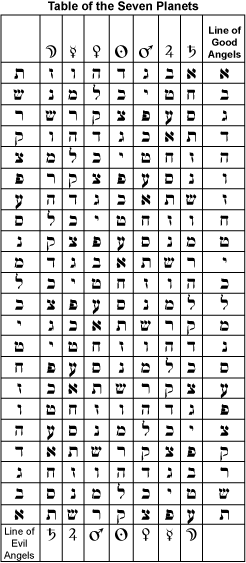
Chart 4[19]
Part II: The Zodiacal Method
If you wish to find the appropriate hierarchy above the Zodiacal Name(s) you’ve produced, use the following chart in the exact manner as the Planetary chart:
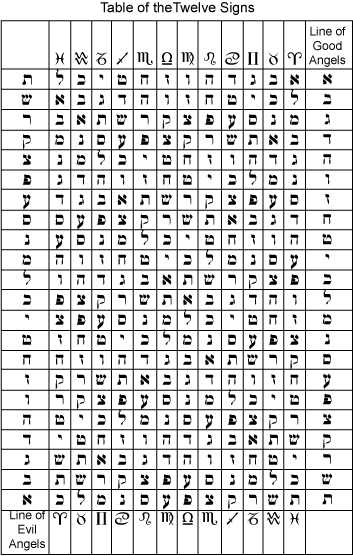
Chart 5
Putting It All Together
Once you’ve derived an angelic Name, either good or evil, you can begin to work with that Name in whatever manner you see fit. In fact, this is an excellent starting point for creating your own ritual work, fully personalized and based around your natal chart and your angel.
You can further explore the concept of creating your own angelic beings from other items in your natal chart. Remember that even the hard and fast rules aren’t really all that. Most of the “rules” (except where specifically mentioned as Agrippa’s) here were created by myself. You should do the same.
All these Angels deal with you, whether you ever notice, evoke, scry them or not. Remember the Talmudic saying, “Every blade of grass has its angel that bends over it and whispers, 'Grow, grow.'” So much more is the life of every man and woman.
Finally, let me mention in passing that you can create angels and hierarchies from other charts as well, either horary or electional charts. This method of deriving angels greatly personalizes the advanced practitioner’s toolkit.
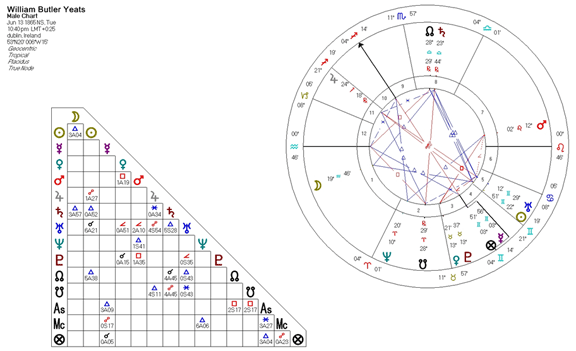
Chart 7[20]
Notes
1. This is based on a longer paper of mine, in private circulation.
2.Tradition varies in the origin of the HGA from one’s natal chart. If one takes the HGA to be the “daimon” of Iamblichus, he states that it can be derived from said chart, while the HGA in modern Hermetic Qabalah may be “above the stars”. I lean toward the latter in this paper, though the more tradition-oriented student may interpret as Iamblichus and others.
3. Henry Cornelius Agrippa, The Fourth Book of Occult Philosophy, Donald Tyson, ed. (St. Paul, Minnesota: Llewellyn, 2009), 547.
4. You’ll note I have not covered the Evil Angels in the detail I have the Good ones. This is not for puritanical reasons, merely for the reason that the derivation of the Evil Angels is just the opposite of the Good, and can be done by the adept on his/her own. I firmly believe (just like in the Abramelin Operation), that once one has connected with one’s Higher Self, the process of dealing with the lower forces is necessary and indeed prudent to make a fully rounded adept.
5. This chart and the following are from Aaron Leitch’s Angelical Language, Volume 1 (St. Paul, MN: Llewellyn, 2010), 219-224, though I have converted his Enochian back into the original Hebrew.
6. Henry Cornelius Agrippa, Three Books of Occult Philosophy, Donald Tyson, ed. (St. Paul, Minnesota: Llewellyn, 200), 547.
7. This chart was derived from Agrippa, The Fourth Book, 125, with corrections made.
8. When you have two planets with equal weight (as in the South & North Nodes here), take the first one that appears on the chart first, starting at the Ascendant and moving counterclockwise.
9. Aryeh Kaplan, Meditation and Kabbalah (York Beach, ME: Samuel Weiser, Inc., 1982), 95. You will note that qibbuts and shureq both contain the same sound, and Abulafia points this out (ibid., 104). It is the opinion of the author that they would then have the same numerical value in this system
10. Agrippa, Three Books, 549.
12. As an aside, Yeats’ angel ![]() , or Mezaqo’a’ayoqonutza is equal in gematria to Atzilut, the highest World of the Kabbalah, as well as Bath Qol or Daughter of the Voice (
, or Mezaqo’a’ayoqonutza is equal in gematria to Atzilut, the highest World of the Kabbalah, as well as Bath Qol or Daughter of the Voice (![]() ). See: Pivik, Brian Gematria and the Tanakh (Lulu Publications): 350.
). See: Pivik, Brian Gematria and the Tanakh (Lulu Publications): 350.
14. Agrippa, Fourth Book, 126.
15. Agrippa, Three Books, 547-548.
16. http://en.wikipedia.org/wiki/Hyleg.
17. Agrippa, Three Books, p.548.
19. This and the following chart from Agrippa, Fourth Book, 141, 143.
20. Chart created using SolarFire Deluxe: http://alabe.com/dlpage.htm